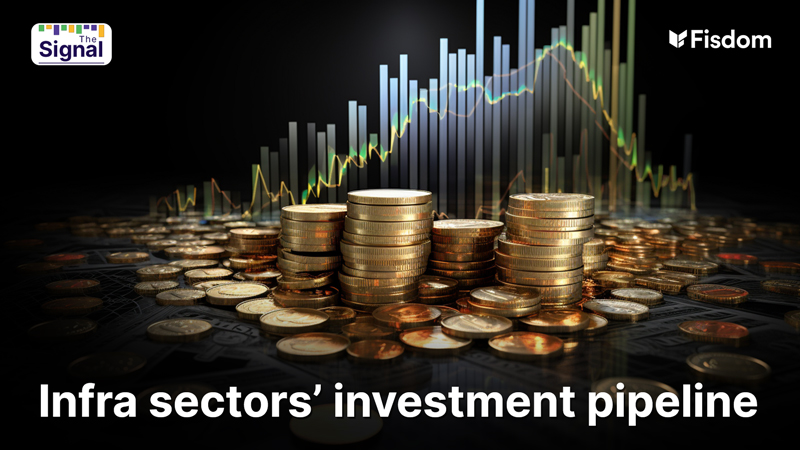
Infrastructure forms the backbone of a nation’s progress, and in the case of India, the road and highway sector stands out as a critical driver of economic growth and development. As the second-largest road network globally, spanning over 6.3 million kilometres, India’s road infrastructure presents a vast canvas for investors seeking lucrative opportunities.
The Growth Story:
India’s road infrastructure has witnessed significant advancements, with the construction of over 35,000 kilometres of four-lane or more highways since 2023 alone. Despite challenges such as traffic congestion and inadequate maintenance, the sector has expanded remarkably, reflecting the government’s commitment to modernizing transportation networks.
Key Statistics:
- India’s road network transports 64.5% of all goods, highlighting its critical role in facilitating trade and commerce.
- Over 90% of India’s total passenger traffic relies on the road network for commuting, underscoring its importance in enabling seamless connectivity.
- Highway construction in India grew at a remarkable 17.00% CAGR between FY16 and FY21, demonstrating sustained investment and development efforts.
- The National Highways Authority of India (NHAI) has significantly expanded the national highway network, from 97,830 kilometers in 2014-15 to 145,155 by March 2023.
Government Initiatives:
The Indian government has rolled out several initiatives to address challenges and spur infrastructure development:
| Government Measures | Impact |
| Allocation of Rs 2.7 lakh crore to Ministry of Road Transport and Highways in Union Budget 2023-24 | Accelerating infrastructure projects and boosting investments |
| Introduction of business-friendly strategies to attract corporate investment | Encouraging private sector participation and project execution |
| Plans for Infrastructure Investment Trusts (InvITs) to raise over Rs 20,000 crore | Mobilizing funds for infrastructure development |
| Implementation of Bharatmala Pariyojana and National Highways Development Project | Development of expressways and economic corridors |
| Focus on rural road connectivity through Pradhan Mantri Gram Sadak Yojana | Enhancing accessibility and connectivity in rural areas |
The outlook for Indian road infrastructure is promising, with robust government commitments, private sector participation, and technological advancements driving growth. The sector is poised to benefit from steady economic expansion, with the government pledging USD 1.4 trillion for infrastructure development by 2025.
Investing in Indian road and highway stocks presents an opportunity to capitalize on the nation’s infrastructure boom. Despite risks such as political uncertainties and project execution challenges, the sector’s long-term growth prospects are compelling.
As India embarks on a journey of infrastructure transformation, investing in road and highway stocks emerges as a pathway to wealth creation. With a conducive policy environment, sustained investments, and technological innovations, the sector is primed to play a pivotal role in India’s economic and social development goals. As investors navigate the opportunities and challenges, seizing the potential of Indian road infrastructure could pave the way to wealth accumulation and prosperity in the years to come.
While the surge in government capital expenditure has undoubtedly fueled a flurry of orders for companies operating in the manufacturing, construction, and infrastructure sectors, investors must exercise caution and diligence before diving into these stocks.
- Orders in these sectors often stem from tender-based contracts characterized by fierce competition. The winning bidder, known as the L1 bidder, secures the project by offering the lowest bid price.
- Investors should recognize that winning contracts at razor-thin profit margins may not necessarily translate to sustainable profitability in the long run.
- Many contracts are structured on a fixed-price basis, leaving little room for cost escalations or delays in project execution.
- Companies must demonstrate robust risk management practices to mitigate the impact of unforeseen challenges and ensure profitability throughout the project lifecycle.
- Efficient execution is paramount for infrastructure companies. While order wins may drive stock prices higher, investors must assess the company’s execution capabilities, including project management expertise and adherence to timelines.
- Neglecting the importance of efficient execution could lead to overvaluation and subsequent market corrections, as witnessed in previous capex cycles.
- Instead of solely relying on metrics like order book to market cap ratio, investors should delve deeper into the company’s financial health and sustainability.
- Factors such as margin stability, return on investment, cash flow management, and debt levels are crucial indicators of a company’s ability to weather market fluctuations and deliver sustainable returns.
- History serves as a valuable teacher, with past instances like IVRCL’s rise and fall underscoring the importance of prudent investing.
- Investors should remain vigilant and learn from past mistakes, avoiding the allure of short-term gains at the expense of long-term stability.
Conclusion:
While infrastructure companies may present attractive investment opportunities amidst a robust capex cycle, investors must exercise diligence and foresight. By prioritizing factors such as risk management, execution capabilities, and financial sustainability, investors can make informed decisions that align with their long-term investment objectives. Ultimately, the key lies in maintaining a balanced perspective and focusing on the fundamentals rather than succumbing to market euphoria.
Till then have a happy weekend!
Market this week
| 05th Feb 2024 (Open) | 09th Feb 2024 (Close) | %Change | |
| Nifty 50 | ₹ 21,921 | ₹ 21,783 | -0.6% |
| Sensex | ₹ 72,269 | ₹ 71,595 | -0.9% |
- The Nifty50 index, after reaching a fresh high in the Budget week, experienced rangebound movement amidst high volatility throughout the week ending February 9.
- This stability was observed following hawkish commentary from both the US Federal Reserve and the Reserve Bank of India, dampening expectations of early rate cuts.
- The sector-wise performance showcased significant gains:
- The Nifty PSU Bank index surged by 5 percent.
- The Nifty Healthcare index recorded a gain of 4.4 percent.
- The Nifty Oil & Gas index rose by nearly 4 percent.
- The Nifty Pharma index witnessed a growth of 3.9 percent.
- The Nifty Media index saw an increase of 3 percent.
- Foreign institutional investors (FIIs) were net sellers during the week, offloading equities worth Rs 5,871.45 crore.
- In contrast, domestic institutional investors (DIIs) provided support by purchasing equities worth Rs 5,325.76 crore.
- However, the overall trend for February so far indicates net selling by FIIs, with equities worth Rs 7,680.34 crore sold, while DIIs bought equities worth Rs 8,661.41 crore.
Weekly Leaderboard
| NSE Top Gainers | NSE Top Losers | ||||
| Stock | Change (%) | Stock | Change (%) | ||
| SBI | ▲ | 11.64 % | UPL | ▼ | 14.19 % |
| BPCL | ▲ | 10.02 % | ITC | ▼ | 5.59 % |
| Coal India | ▲ | 8.67 % | Bajaj finserv | ▼ | 4.88 % |
| Sun Pharma | ▲ | 8.34 % | Kotak Mahindra Bank | ▼ | 4.42 % |
| TCS | ▲ | 4.22 % | Britannia Industries | ▼ | 3.44 % |
Source: BSE
Stocks that made the news this week:
- Shares of IndiGo and SpiceJet faced declines in the morning trading session following a proposal by a parliamentary panel suggesting route-specific capping of airfare. The panel further recommended establishing a distinct entity to oversee and manage air ticket prices amid growing customer apprehensions regarding escalating airfares. Highlighting concerns over airlines’ self-regulation of ticket prices, the panel noted a lack of effectiveness in the current approach based on feedback from the Civil Aviation Ministry.
- On February 9, Bajaj Finance sold 8,04,629 shares, amounting to a 0.88 percent stake, in Strides Pharma Science at an average price of Rs 713, totaling Rs 57.37 crore. Concurrently, Amansa Holding Private Ltd acquired 11,40,301 shares, equivalent to a 1.24 percent stake, at the same price, investing Rs 81.30 crore in the company. Consequently, Strides Pharma Science’s stock price declined by 2 percent to Rs 699.2 on the BSE. Additionally, Societe Generale purchased 2,58,071 shares of Apollo Pipes at an average price of Rs 766.13 through open market transactions, accumulating a Rs 19.77 crore equity stake in the company.
- Hero MotoCorp reported a remarkable 51% year-on-year increase in standalone net profit to Rs 1,073.38 crore for the quarter ending December 31, 2023, attributed to easing input costs, operative leverage, higher average selling price, price hikes, and increased volumes. This exceeded analysts’ expectations, with the company surpassing the estimated 47.39% growth in net profit and achieving revenue from operations of Rs 9,728 crore, marking a 21.1% increase compared to the same period last year, according to estimates by six brokerage firms.














